Visit the gallery linked below to select photos for download.
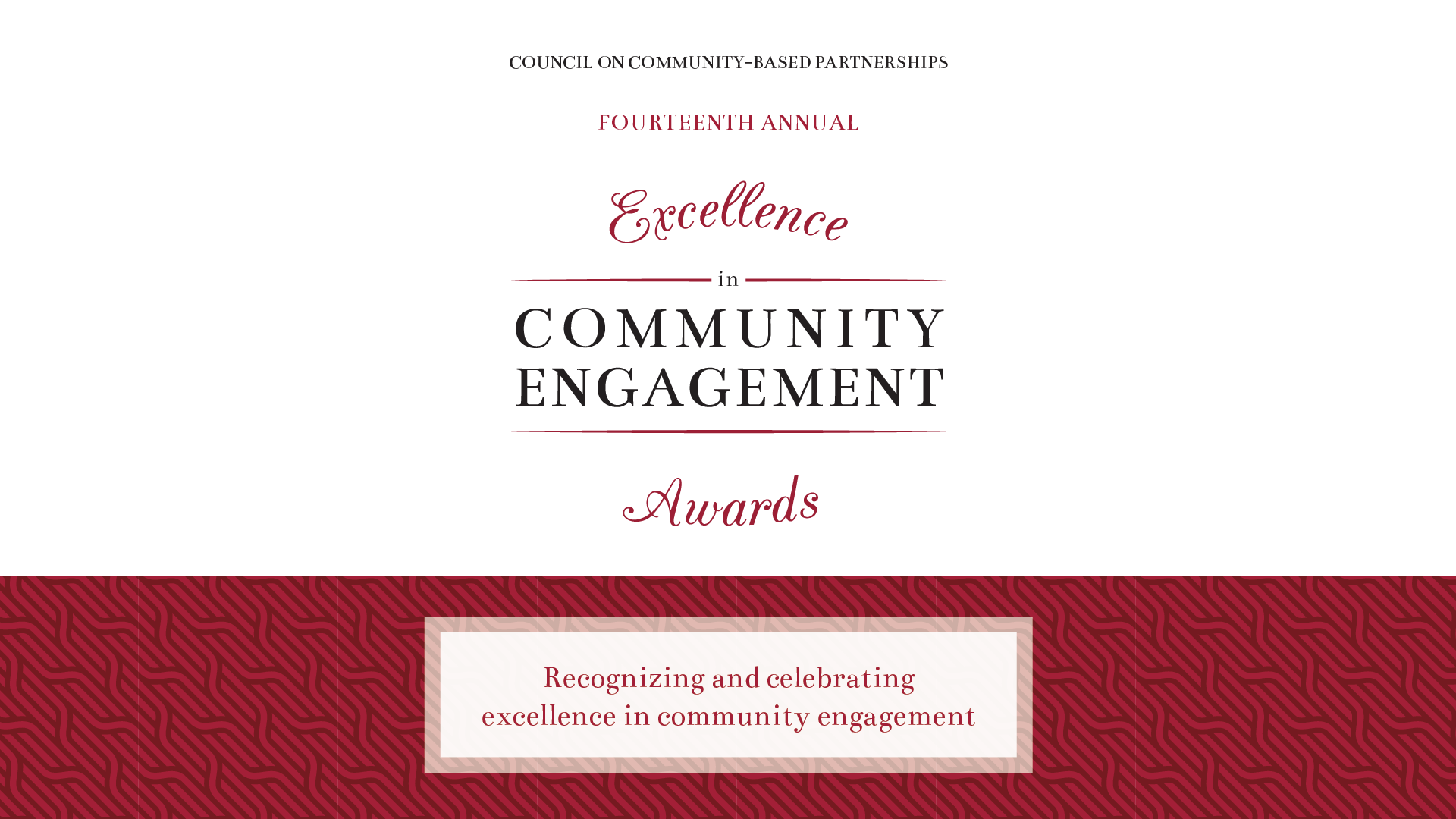
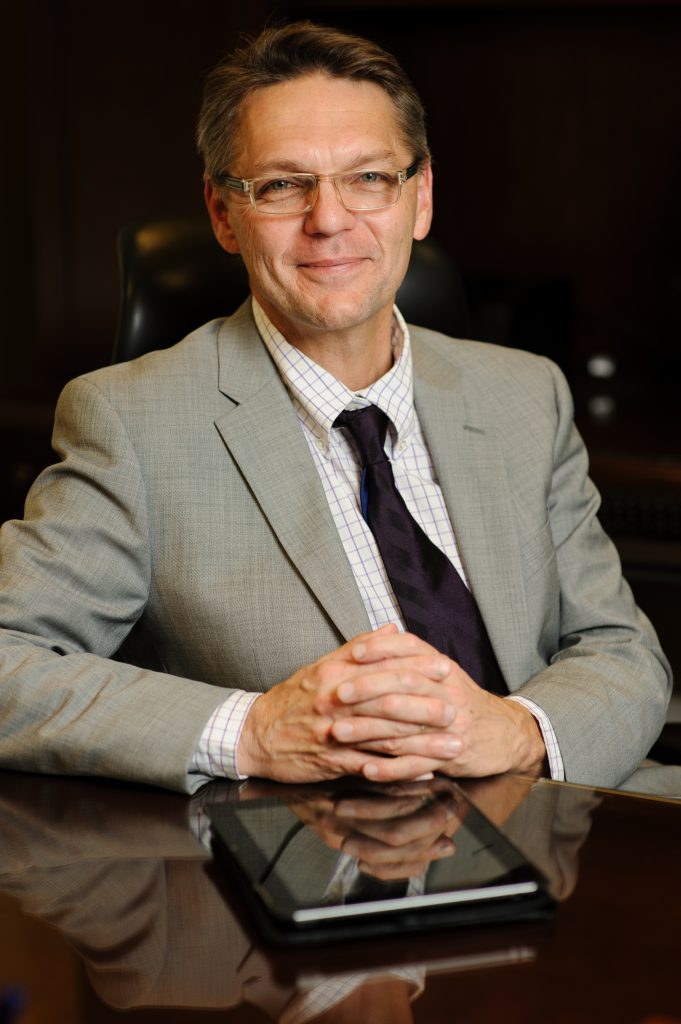
A message from
Dean Hlebowitsh
We have great news to share about this year’s Council on Community-Based Partnerships Excellence in Community Engagement Awards! We may not be able to celebrate our award winners in person, but we can do our best to demonstrate their work online.
Each year we honor the best work in engagement scholarship, and this year, our 14th year, we have no small number of people to acknowledge. To this end, we put together an online program that aims to display the remarkable accomplishments that have arisen from our community partnership program and that have given new hope and promise to the lives of people across our state.
And while the present condition is unlike any other in our lifetime, our work still moves forward, knowing that our best efforts are still in front of us.
Executive Committee Chair,
Council on Community-Based Partnerships
Dean, College of Education
The University of Alabama
Want to download an award photo?
Outstanding Special Achievement in Community Engagement Award
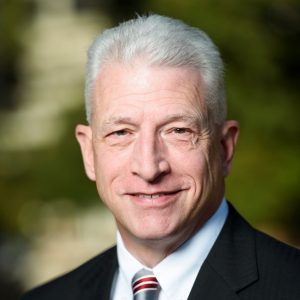
Dr. Kevin W. Whitaker
Executive vice president and provost Dr. Kevin W. Whitaker has been named the recipient of the Outstanding Special Achievement in Community Engagement Award. Whitaker, a veteran University of Alabama administrator and faculty member, is being recognized for his superior leadership, exemplary efforts and outstanding vision in fostering and supporting mutually beneficial community-campus partnerships that enhance quality of life for individuals, families, and communities, and for encouraging countless others to do the same.
zachary david dodson memorial endowed scholarship
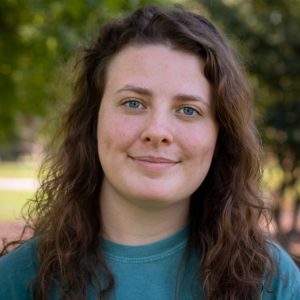
Katie Johnson
Kaitlyn “Katie” Johnson is the 2020 recipient of the Zachary David Dodson Memorial Endowed Scholarship. A Rainsville native, she is a junior majoring in anthropology with minors in Latin and Ancient Greek. As part of her duties with the Center for Community-Based Partnerships’ Global Café, Katie serves as a tutor for international scholars, helping them learn conversational English and understand American language and culture. Previously nominated as the Federal Work Study Employee of the Year, Johnson maintains a 3.839 grade point average and has been named to the President’s and Deans’ Lists. In addition to her work with Global Café, Johnson has served as a student assistant with the Alabama Blues Project, where she provides clerical services, assists with fundraising events and plans and carries out art-related activities with children in the Tuscaloosa schools. She is a member of the college honorary Eta Sigma Phi, as well as the National Society of Collegiate Scholars (NSCS) and is the recipient of several scholarships.
Distinguished Community-Engaged Scholar
Faculty/Staff
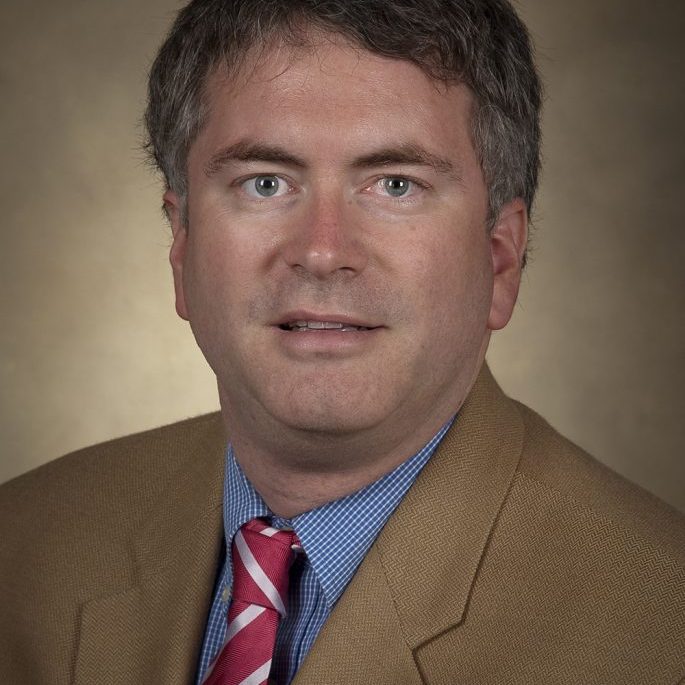
Jeff Gray
Dr. Jeff Gray, professor of computer science, is a national leader in computer science education. He has worked tirelessly to bring computer science education to public schools over the past 20 years, with special attention to bringing these skills to underserved populations. Gray is a big reason why The University of Alabama has been a top-50-ranked research university for many years, with grants in the millions of dollars. But that’s not why he is receiving this recognition. Many professors might be satisfied just to be highly ranked among their peers, but not Jeff Gray. He is a role model for those who wish to have a greater impact on their communities. This first-generation college graduate who grew up in the self-described Mayberry-esque town of Glen Dale, West Virginia trains high school teachers to teach advanced placement computer science courses. He also hosts an annual Alabama Robotics Competition for middle and high school students. Looking back at his own attendance at science fairs he says, “I know that’s what got my own passion started.” He saw that few high school students in Alabama were receiving computer science education, leaving them unprepared for the best jobs. Gray sought to change this through offering summer programs at the University. He quickly saw he could have a greater impact if he focused on training teachers rather than students. He developed a course that now has 120 videos for teachers. After receiving his first Google grant, Gray went on to receive an additional $1 million in funding from the National Science Foundation to expand computer science education throughout the state. Gray is co-chair of the Governor’s Computer Science Advisory Council and works with the College of Education to get teachers certified to teach computer science. Statewide there are 130 teachers trained in teaching advanced placement computer science compared with just three in 2007. Gray says not everybody needs to become an engineer, but that students need to understand how computers work underneath so many subjects. Only 27 students took the state computer science principles exam in 2007. In part because of Gray’s work, today that number is more than 2,000, with a much higher percentage of them females and African American than in 2007.
Distinguished Community-Engaged Scholar
Student
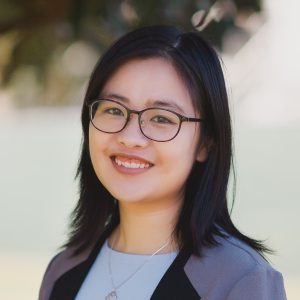
Sophia Xiong
Aptly nicknamed Sophia by her classmates (Sophia was derived from sophia, the Greek word for “wisdom”), Xiangyan Xiong has been an all-purpose journalist in the Center for Community-Based Partnerships (CCBP) for the past three years, much of that time as a volunteer. A recipient of the MA in Communication Studies from the University in 2017, she received the BA in Communication from China Agricultural University in Beijing in 2015 and is nearing completion of a second master’s degree in Women’s Studies. At CCBP, Xiong works as a photographer, videographer, video editor and writer of news and feature articles. Dr. Ed Mullins, director of Research and Communication at CCBP and editor of much of her work, says that Sophia has become one of the department’s most valuable assistants over the past year and a half and shares that she is most deserving of this recognition. Xiong has juggled her duties at CCBP with a teaching assistantship in the departments of Gender and Race Studies and Communication Studies. Before coming to the United States, she worked for magazines in China in the energy and environment sector. One of her hobbies is choral singing, and she has been a member of church and college choirs in Beijing, where she was also a Red Cross volunteer. As a UA student, Xiong has presented academic papers or served on panels at several regional and national conferences.
Distinguished Community-Engaged Scholar
Community Partner
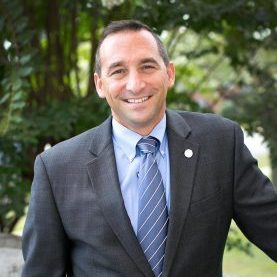
Dr. Michael J. Daria
Since 2016, Dr. Michael J. Daria has been the visionary superintendent of Tuscaloosa City Schools. He is known for his strong support of students seeking higher education and for his leadership and frequent attendance of community-family educational collaborations on The University of Alabama (UA) campus. During his 25-year educational career, Daria has served, in addition to his present position, such positions as English teacher, principal, and assistant superintendent. He received his EdD in educational administration from UA. He and his wife Susy have two children, Nicholas and Tyler. Nicholas, now a student at the University, is a graduate of Tuscaloosa City Schools, where Tyler is a current student. Dr. Jim McClean, executive director of the Center for Community-Based Partnerships (CCBP), shared that what separates Dr. Daria from so many superintendents is his children-first philosophy, noting that in every decision he makes, his first consideration is the impact it will have on students. Daria led the adoption of the Strategic Plan for City Schools, designed to put Tuscaloosa City Schools in the highest ranks by ensuring the success of all students, by attracting, retaining and rewarding the best employees, and by providing facilities for an optimal learning environment. Daria has been a strong supporter of many CCBP programs, including the Parent Teacher Leadership Academy, Vision Days, and the STEM Entrepreneurship Academy. Community Affairs Vice President Samory T. Pruitt said that Dr. Daria is constantly seeking ways to develop relationships and collaborations with community partners to increase learning opportunities for students. Daria recently signed a new contract with incentives to continue as superintendent of Tuscaloosa City Schools until 2023. In extending his contract, School Board President Eric Wilson called Daria “a rising star,” adding that Tuscaloosa was fortunate to have such a capable educational leader. The University is equally fortunate to have such a big supporter of its community engagement programs.
Outstanding Community Partner-Initiated Engagement Effort
Fuse Project
Ann-Brooks Morrissette, Freddie Stokes, Grant Zarzour, Matt Zarzour
This 501(c)(3) organization in Mobile was founded in 2012 to benefit children along Alabama’s Gulf Coast. Its founders believed a small motivated group could have a big impact through realistic projects. In Mobile, where a child from the richest ZIP code lives 25 years longer than one from the poorest, Fuse Project has raised more than $2 million to support the work of 45 local projects. Its major achievement is the creation of Fuse Factory, which provides individualized office and event space from which organizations can collectively expand their reach and carry out their mission. Offering space at below market value with shared amenities significantly reduces overhead, allowing multiple organizations to focus more on their mission and worry less about expenses. Fuse Factory clients include the National Multiple Sclerosis Society, Veterans Recovery Resources, Hands and Feet Ministries, Big Brothers and Big Sisters of South Alabama, Little Angels, Inc., Innovation Portal Mobile, and many more. Fuse Project brings together successful initiatives from throughout the area and invests in them. Emphasis is on working together with leaders and residents to provide a community-specific mix of facilities, programs and services that honor local history, reflect local priorities, promote healthy lifestyles, create jobs and reduce crime. The Fuse Project team aptly describes itself in practical terms, not as superheroes with capes, but “wearing gloves with shovels in hand, ready to work side by side with the people already there.”
Sowing Seeds of Hope
Frances Ford
A continuing partnership between Dr. Chapman Greer’s University of Alabama Business Communications class and Perry County’s Sowing Seeds of Hope, a 501(c)(3) nonprofit, has resulted in the completion of a feasibility study for the addition of a critical access hospital in the county. Perry County has been without emergency services for more than two decades, and for the past three years has needed a feasibility study in order to acquire essential funding, request a change in the state’s health plan and obtain a certificate of need. Dr. Greer and her students gathered the necessary data to understand health issues facing a rural area such as Perry County. She and her class traveled to Marion, the county seat, to obtain data about the community in order to make comprehensive recommendations. In a statement regarding the partnership, Sowing Seeds of Hope Executive Director Frances Ford shared the following: “The resulting study is relevant, thorough, and professional. We believe it reflects favorably on Dr. Greer’s leadership, pedagogical method, and engagement with her students. … It has been an honor and a pleasure to work with Chapman, and we are truly grateful for the work that she and her students have done to bring our dream of a Perry County critical access hospital one step closer to reality.” The partnership illustrates the best in community/university cooperation and partnership, giving students the opportunity to take their education to the field to provide a valuable public service.
Outstanding Student-Initiated Engagement Effort
UASpace
Dr. John Baker, Piper Daniels, Ian Noonan
UASpace, a multidisciplinary student organization open not only to science and engineering students but to all undergraduate and graduate students at the University, is pursuing a goal of making The University of Alabama a space-faring university by successfully launching and placing a very small satellite — called a CubeSat — in orbit around the earth. CubeSats make it easier to test experimental technologies and conduct scientific experiments as compared to full-sized satellites. Not only do these students hope to put a satellite into space, they also are sharing their knowledge and passion for science, technology, engineering and mathematics (STEM) with students in Alabama’s Black Belt communities. Aerospace engineering student Ian Noonan is president of UASpace. MBA student Piper Daniels is program manager. They coordinate the program for students from the College of Engineering and Culverhouse College of Business. Additional coordination takes place with community partners and sponsors like Lockheed Martin, Linc Research, Inc., the Alabama Space Grant Consortium and the National Aeronautics and Space Administration. UASpace hopes to inspire the next generation of students to pursue STEM fields.
Hands in Health
Dr. Jen Nickelson, Devin O’Neal
Founded in April 2019, Hands in Health is a multidisciplinary student organization housed in The College of Human Environmental Sciences at The University of Alabama (UA). The organization is open to any UA student interested in public, community or UA health, regardless of GPA or major. Its purpose is to advance the professional competency and dedication of individual members who have an interest in health and wellness. Hands in Health provides both undergraduate and graduate students opportunities to gain experience in health-related service, teaching, advocacy and research. Hands in Health, under the leadership of club president Devin O’Neal, is a sister organization of the successful Eta Sigma Gamma national health education and health promotion honorary society. The organization has worked with communities like Holt, planning the Holt Community Health Fair, the Holt Senior Flu-Shot Clinic and Holt Clean-up. In spring 2020, the group partnered with the UA Division of Community Affairs’ Saving Lives initiative to provide healthy nutrition and physical activity guidance for the annual American Heart Association’s Heart Walk in Tuscaloosa, which raises some $200,000 annually for heart research while helping to educate the community about good heart health. The organization also implemented Condoms & Candy, a Valentine’s Day activity on campus during which group members handed out condoms, candy and a brochure on safe sex, as well as a quiz for students to determine their sexual health knowledge in an effort to promote public health around the greater Tuscaloosa community. More at the Hands in Health webpage.
Outstanding Faculty/Staff-Initiated Engagement Effort
Biology Outreach Program
Christine Jeana Yates
Instructor, Department of Biological Sciences
The goal of the Biology Outreach Program is to raise the awareness of environmental issues such as animal conservation, clean water and food production. This program also helps K–12 students learn the science behind nutrition, dental hygiene, and heart, ear and eye health. In addition, the program stresses the importance of exercise and teaches the functions of body systems, brain activity and mental health. Studies show that providing young children a strong science foundation results in higher achievement in middle and high school and provides them with more career opportunities in the sciences. Student volunteers play a key role in the program by helping K–12 students increase their science literacy, self-esteem and school attendance. The students also learn what it is like to be a secondary educator in the science areas, where there are chronic shortages. To date, the program has produced five secondary science educators. Activities include creating and teaching STEAM (science, technology, engineering, art and math) lessons in cooperation with the local partners. UA’s outreach in this area serves three groups: K–12 Tuscaloosa city and county students, UA students, and community partners. These include teachers and administrators in the city and county schools, Tuscaloosa Parks and Recreation Summer Program, Girls Scouts of North Central Alabama, Boys and Girls Club of West Alabama, Children’s Hands-on Museum, the Tuscaloosa Public Library Summer Reading Program and the UA Arboretum, all of which provide physical locations for the program.
SMART™ Clinic
Dr. Laura M. Hopson
Associate Professor, School of Social Work
Dr. Karl Hamner
Director, Office of Evaluation and School Improvement, College of Education
This award recognizes the implementation of the SMART™ Student Health Clinic in Reform Elementary School in Pickens County. The SMART™ (School Health Model for Academics Reaching ALL Transforming Lives) Clinic, is a national whole-child physical, emotional and mental health program focused on the well-being of students in the context of the school community. Developed and implemented by Ginn Group Consulting with funding from CVS and Aramark, the model is innovative in that it provides integrated medical and mental health services. Its purpose — called by many experts as a “revolutionary” educational health plan — is to prevent, screen and manage all health risks in schools, thus reducing barriers to academic success. The public-private partnership that fuels the SMART™ model employs physical, behavioral, social and emotional interventions as a natural partner to healthcare in public schools. In Pickens County, which has few mental health services providers, UA faculty collaborated to supervise 3–4 graduate social work interns per year to provide mental health services to students. Collected data on the interns’ services shows their impact to be significant. Just six months after opening the SMART™ Clinic in Pickens County, chronic absenteeism had dropped 55%, attendance increased substantially, and standardized test scores were on the rise. This best-practice model is being successfully put in place not only in rural Alabama but all over the nation, with plans for major expansion over the next few years.
Seed Fund Awards
Panola Munch and Learn
Dr. Betty Key
Assistant Professor, Capstone College of Nursing
Community Partner
Lovie Parks, Panola Outreach Program
Amount Funded
$5,000
The closest supermarket to Panola, in Sumter County, is 30 miles away. More than a third of the population of this 200-member community live in poverty, with an average income of around $23,000. Panola is a classic food desert. This partnership with the non-profit Panola Outreach will bring healthy food to senior citizens and others and build a sense of community between the town of Panola and The University of Alabama as the community gains access to healthy food and information about cardiovascular disease (CVD). The partnership will be sustained through the ongoing distribution of health information from Dr. Key and the cultivation of community gardens. Some 100 individuals will receive healthy foods from the West Alabama Food Bank’s Mobile Pantry. They will also receive an informational flyer about CVD risks and how to address them. An interesting aspect of the project is that volunteers will participate in a theatrical skit about how healthy foods and physical activity affect CVD. Audience members will be asked to write down one thing they learned about CVD risks before they leave. Information gathered will help inform future research studies on how to promote healthy food for communities located in food deserts. UA nursing students and nurses from the West Alabama Black Nurses Association will be recruited to help with food distribution, the skit production and data collection. Panola Outreach will increase the visibility of The University of Alabama in Sumter County and, in keeping with the mission of the Center for Community-Based Partnerships, “connect faculty, staff, students and community partners” to help solve a critical problem in the area.
Travel Fund Awards
Improving Kindergarten Readiness through the JumpStart Summer Program: A Pilot Study
Dr. Alison Hooper
Assistant Professor, Department of Curriculum and Instruction
Dr. Cheryl Fondren
Success by 6 Program Director, United Way of West Alabama
Community Partner
United Way of West Alabama
Attending
National Research Conference for Early Childhood
Arlington, Virginia
Amount Funded
$2,000 ($1,000 each)
The JumpStart Summer Program is a community-engaged project focused on improving kindergarten readiness for students in Tuscaloosa and surrounding communities. JumpStart has a history in the West Alabama region, and the director was interested in revising the program to align with best practices related to early childhood education. With support from The University of Alabama’s College of Education and United Way of West Alabama, JumpStart seeks to help students grow in literacy skills and math concepts upon starting elementary school. Summer 2019 was the first time the revised curriculum, training and assessment procedures were implemented. The participating children showed significant growth in literacy skills, math concepts and self-regulation, as measured by direct child assessments before and after the program. UA students served as data collectors. Results suggest that short-term intervention prior to kindergarten is an effective and feasible way to boost kindergarten readiness for children who have not attended an early education program.
Graduate Student Fellowship
In Our Backyard: Engaging with Stakeholders to Address Rural Wastewater Management in the Black Belt of Alabama
Jillian Maxcy-Brown
Graduate Student, Civil, Construction and Environmental Engineering
Project
In Our Backyard: Engaging with Stakeholders to Address Rural Wastewater Management in the Black Belt of Alabama
Principal Investigator
Dr. Mark Elliott
Associate Professor, Department of Civil, Construction and Environmental Engineering
Community Partners
Hillary Beard, Congresswoman Terri Sewell‘s Office; Sherry Bradley, Alabama Department of Public Health; Ron Ross, Hale Empowerment and Revitalization Organization (HERO)
Rural residents without sewer access typically use septic systems to treat human waste. However, much of the soil in Alabama’s Black Belt is vertisol (clay), which swells when wet, becoming impermeable. Because septic systems require wastewater to soak into the ground, they quickly fail in this soil. The rural poor cannot afford alternative systems that can cost over $20,000, which means that most homes discharge raw sewage onto the ground through straight pipes, typically into the woods or yard behind the home. While illegal, a recent study in Wilcox County found that 60% of unsewered homes used a straight pipe, indicating that millions of gallons of raw sewage are discharged to the ground in the Black Belt every day, bringing a host of health impacts. This fellowship will support graduate student Jillian Maxcy-Brown in her master’s thesis and doctoral studies as she provides leadership, community relations and coordination with communities where wastewater problems exist. The Consortium for Rural Alabama Water and Wastewater Management has been formed to collaboratively address this issue. Maxcy-Brown’s main role will be to lead and organize the University’s engagement with the consortium and community partners, as well as to present findings at relevant conferences.
